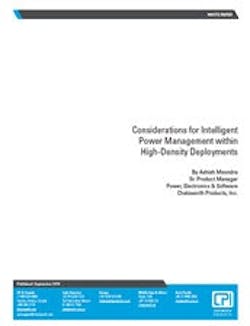As data centers deploy virtualization and consolidate equipment for more efficient computing, the average rack power density is constantly rising. While an average cabinet supported 3 – 4 kW a few years ago, today that power management load is considered in low-density environments. It is certainly not uncommon to have cabinets drawing 9 – 15 kW and in several cases, even higher than that.
With the rise in processing being done at every cabinet, strong attention needs to be paid to the cabinet power distribution strategy so that the highest levels of availability and efficiency are achieved with minimum management overhead.
To ensure highly available power to IT equipment, all power components in the power chain need to have monitoring capabilities.
Rack power distribution units (PDUs) represent the last leg of the power chain. Therefore, it is critical that organizations choose rack PDUs with monitoring capabilities for high-density deployments. In fact, recent research2 shows that the rack PDU market is being driven by higher power ratings, desire for more intelligent products, demand for intelligent and security features, need for power provisioning, capacity planning and remote control. This paper discusses the electrical, physical and management considerations for effective cabinet-level power management within such high-density scenarios. It presents six key considerations when deploying intelligent PDUs into high-density cabinets and also covers the management of cost and security associated with the deployment of intelligent PDUs.
Six Key Considerations when Selecting Intelligent Rack PDUs for High-Density Cabinets:
• Appropriate input circuit – to handle required capacity
• Adequate outlet type and density – to plug all equipment
• Branch over-current protection type – to minimize nuisance tripping and downtime
• High ambient temperature rating – for reliable operation within hot aisles
• Appropriate functionality level – to monitor at the rack- or device-level
• Continual monitoring – to enable proactive notification of impending issues
